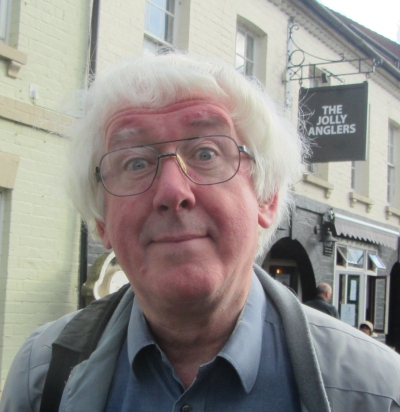Dave Langford writes:
My Milford attendance record was nothing to write home about, let alone pad out to a six-volume fantasy trilogy. All “my” Milfords were in the early though not the earliest days at the Compton Hotel, Milford-on-Sea. The Langford era ran from 1977 to 1984, skipping 1979 because that year’s UK Worldcon led to Milford being cancelled, and missing the 1983 event as a personal decision after long and painful study of my credit card statement.

Milford 1980; (standing) l-r: Alan Farmer, Richard Cowper, Christopher Priest, Christopher Evans, Randal Flynn, Bobbie Lamming, Philippa Maddern, Tony Richards, Robert Holdstock, Patrice Duvic. (sitting) l-r: Marianne Leconte, Pamela Bulmer, Garry Kilworth, David Langford (Photo kindly sent by Christopher Priest)
Like everyone else, I loved the company, the literary chat and the scandalous after-hours gossip about publishers and editors. But thanks to my infamous hearing trouble, I never really got the hang of the big story-discussion circle that filled the whole Compton lounge every morning and every afternoon. The best ploy was for me to follow the Speaking Object – the copy of the MS that granted the right to hold forth, as in Lord of the Flies – around the room and get as close as possible to the current speaker. This seemed vaguely disruptive; my fallback option was to stay put and hope that the best critiques came from the Milfordians with the loudest, clearest voices. One way of telling that recent mumbly noises from the far side of the room had been positive about my story would be the loud clear voice of David Garnett – who never liked to join in any cosy consensus – saying, “WELL, I THOUGHT IT WAS FUCKING AWFUL.”
As far as I can remember I sold all but one of the stories I took to the workshop, the exception being a too-hasty “Milford admission ticket” effort from whose heartily execrated wreckage it seemed possible to save only a single favourite image. Which, as it turned out, worked more effectively in a quite different fictional framework.
According to the infallible Milford website, the first Langford tale to be hauled over the coals was “Serpent Eggs”, which started life as a kind of technothriller with an investigator looking for incredibly dangerous strategic material that might or might not exist on a Scottish island inhabited by a colony of not entirely ept ecological fanatics. Richard Cowper, as I remember, gently set me right about plausible firearms for rabbit-shooting – I don’t think I’d specified an express rifle, but the details are shrouded in merciful amnesia; Rob Holdstock cheered me hugely by very much liking the melodramatic climax; David Garnett said something highly characteristic of David Garnett (see above); and Chris Priest opined that there were the makings of a “strong, ironic story” here … but only, he conveyed, the makings.
Years later I took that advice, though almost certainly not in the intended way, and rewrote “Serpent Eggs” with the same setting but a somewhat different protagonist who fancied himself as an occult investigator on the trail of Lovecraftian horrors. At the melodramatic climax, he discovers – but still fails to understand – that the actual secret is a worse horror arising not from the Cthulhu Mythos but from physics. Fifteen minutes of fame ensued when the story was reprinted in a Year’s Best Horror anthology. That’s how, on one occasion, the Milford process worked for me.
Perhaps I should have cultivated workshop gamesmanship like Patrice Duvic, who one fondly remembered year brought a bottle of fine brandy with him from France and immediately before his story came to judgment insisted on pouring everyone a large glass. (That must also have been the year he borrowed my portable typewriter, which inevitably did not have an AZERTY keyboard, and with every wrong keystroke filled the air with cries of “Aagh! French letter!”)
As I grew deafer, Milford became a tougher proposition and I drifted out of the habit, but stayed connected for many further years as treasurer with power of high, middle and low justice over a bank account whose balance sometimes soared into the low three figures. Those were the days.
 David Langford <http://ansible.uk/> has won ever so many Hugo awards, none alas for a Milford story. He mostly writes nonfiction these days; distractions include the SF Encyclopedia <http://sf-encyclopedia.com/>, the long-running SF newsletter Ansible <http://news.ansible.uk/> and the doomed small press Ansible Editions <http://ae.ansible.uk/>. His mad-scientist lab is working to perfect the Deaf Ray.
David Langford <http://ansible.uk/> has won ever so many Hugo awards, none alas for a Milford story. He mostly writes nonfiction these days; distractions include the SF Encyclopedia <http://sf-encyclopedia.com/>, the long-running SF newsletter Ansible <http://news.ansible.uk/> and the doomed small press Ansible Editions <http://ae.ansible.uk/>. His mad-scientist lab is working to perfect the Deaf Ray.

Pingback: Pixel Scroll 10/11/16 When An Unscrollable Pixel Meets An Irretickable File | File 770
Do histories of the US Milford exist somewhere accessible?
LikeLike
All the histories of Milfords since 1972 (and what we can find out about the American ones between 1956 and 1971) are on the Past Milfords page on the website at http://www.milfordSF.co.uk. We’ve recently come across some documents that might add more to the early pages, but I haven’t had time to go through them ye. They are currently with a committee member for scanning.
LikeLike